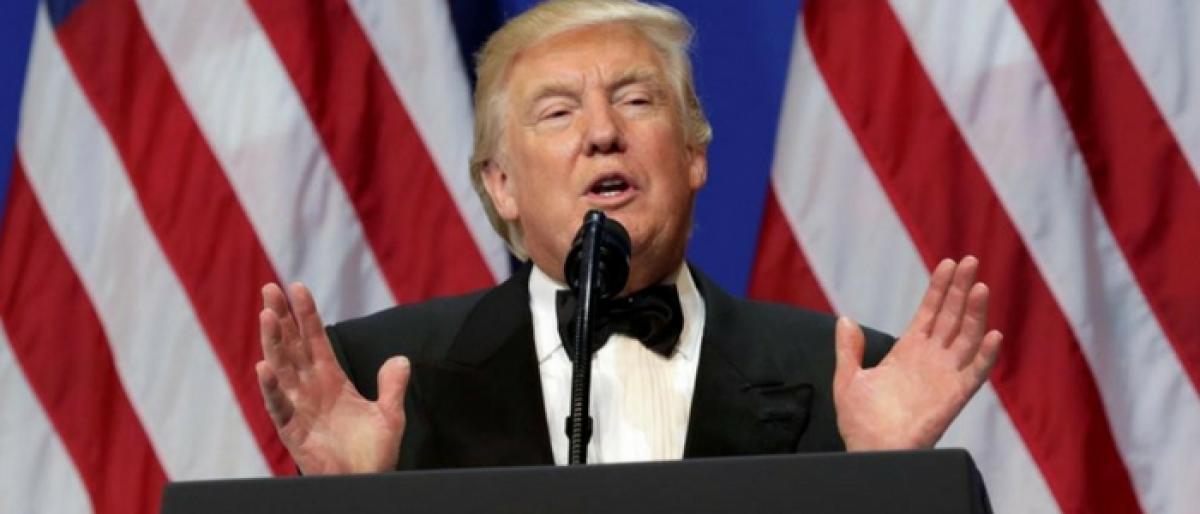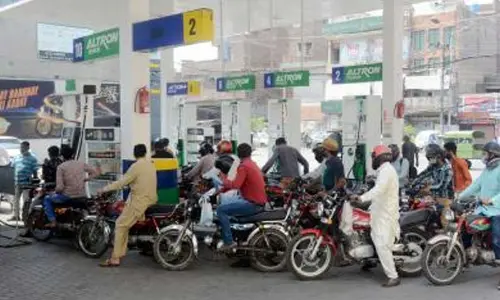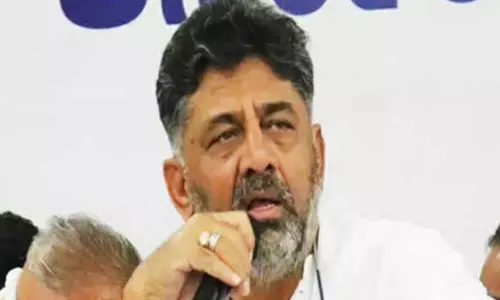Trump’s claims pure hot air

The US President gave a shock to the entire world, including India, by announcing exit from the Paris Climate Pact 2015. In the series of reversal of Obama administration’s decisions, which were not consistent with his policies, Donald Trump has once more stepped on a subject that will have multiple consequences on international dealings in a variety of ways.
US President alleges that India makes its participation contingent on receiving billions and billions and billions of dollars in foreign aid from developed countries” – a gross exaggeration as the total foreign aid to India was said to be only $3.1 billion in 2015 of which the share of the US was only $100 million
The US President gave a shock to the entire world, including India, by announcing exit from the Paris Climate Pact 2015. In the series of reversal of Obama administration’s decisions, which were not consistent with his policies, Donald Trump has once more stepped on a subject that will have multiple consequences on international dealings in a variety of ways.
For one, Prime Minister Modi is expected to take up the issue with Trump on his visit to Washington on June 25. More so, as Trump accused New Delhi saying: “India makes its participation contingent on receiving billions and billions and billions of dollars in foreign aid from developed countries” – a gross exaggeration as the total foreign aid to India was said to be only $3.1 billion in 2015 of which the share of the US was only $100 million. India obviously is forced to respond as a victim to the normal human tendency to insult and humiliate aid receiver while maintaining cordial relations, notwithstanding Trump’s decision following his election promise and was expected to come at any time.
Trump had promised to quit Paris Climate Agreement within 100 days of assuming office and to renegotiate for a fresh deal. By this announcement, Trump claims he is only fulfilling his “solemn duty to protect America and its citizens.” The reasons given for this decision of immense global implications are meant to impress local audience and maintain a stance of overwhelming preoccupation with American interests.
For the President, the Climate Pact was a bad economic deal that would put the US at a disadvantage against its international competitors. In detail, it would undermine the US economy, hamper American workers, and weaken US sovereignty – strong enough reasons for a national leader to safeguard his pre-eminent position if the fears are genuine.
The tragedy is that the world has reached a stage where immediate climate control has become unavoidable for the very survival of the planet.
The greenhouse effect used to describe the increase in the earth’s average temperature that has been recorded in the past 100 years was discovered by Joseph Fourier (1768-1830), a French physicist in 1824 and was first quantitatively investigated in 1896 by a Swedish scientist. It is the process by which the absorption and emission of infrared radiation by atmospheric gases warm a planet’s lower atmosphere and surface. However, there are differences in assessing the strength of changes in greenhouse effects relative to human activities.
Continuous build-up of carbon dioxide and other greenhouse gases as a result of human activities and application of many machines has been conclusively proved. Accompanied with decrease in forest cover and green fields, it produces a combined effect in raising temperature and causing climate changes, according to scientists.
Global warming is one of the biggest threats to the world capable of causing immense damages to life. It can cause many changes like glacial retreat, Arctic shrinkage, sea level rise, flood and ultimate drying up of rivers, cyclones, and drastic climate changes.
The Paris Climate Accord (2015) arrived at the UN Framework Convention on Climate Change set a goal of “well below 2 degrees C” for temperature rise and instituted a regime of financing of developing economies and provision of technical help to make the transition. The Pact was to go into effect by 2020.
It is governed by voluntary pledges of nations. The principle of Common but Differentiated Responsibilities ensuring equity was incorporated in the Paris Agreement to enable developing countries to continue their development projects while implementing the Agreement.
Differential responsibility is a vital feature of the Pact which places heavier responsibility on developed countries. The logic is that global warming and consequent climate change are caused by uncontrolled carbon emissions from their industrial, automobile and other sectors. Developing countries need some amount of freedom to carry on development schemes to catch up with others.
India ratified the Paris Agreement on Climate Change in October 2016. With this, 62 countries that were responsible for about 52 per cent of greenhouse gas emission had signed the Pact. It requires the signatories to submit a national inventory of gas emissions arising from human activity which would ensure transparency in the working of the Agreement. Such a clause also reduces scope for violations of the Pact.
The world’s most powerful President played a victim’s card in announcing the decision to quit claiming that the Paris Accord placed the US in disadvantageous position and more than that, placed India and China in the most advantageous situation. He openly lamented that the US had become a victim of global machinations. “The Paris Accord is very unfair at the highest level to the United States,” he stated.
Trump calculated that job loss to his country by adhering to emission norms prescribed in the Pact would go up to 2.7 million by 2025. His grievance is that the limits prescribed by the Pact allow India to double its coal production whereas USA has to stop it.
He overlooks or rather repudiates the principle of differential restrictions for developed and developing countries so that countries like India are not prevented from making industrial progress. International pacts in the age of globalisation are not and cannot be meant to preserve inequalities and keep the developing nations forever developing behind the developed.
There are three main agencies in the US government concerned with fighting global warming – the Environmental Protection Agency, the Department of Energy, and the Department of Interior. All the three have either denied or expressed disbelief in the scientific opinion that human activity is causing global warming.
If action follows immediately after Trump’s announcement, the Clean Power Plan of the Environmental Protection Agency of the US, which requires States to lower carbon emissions from electricity sector, may be dropped. Fuel economy regulations for cars and trucks, clean energy tax incentives and research spending may also get reduced.
The future of Green Climate Fund based in South Korea may become uncertain as it was created to provide funds for technological innovations to fight climate change in developing countries. So also the Loss and Damage Mechanism through which rich nations could pay compensation to developing countries in case of climate-induced natural disasters may get weakened.
America’s exit will lessen the vigor and enthusiasm of other countries in adhering to Paris Pact and would also nullify the effects of their actions. However, a saving factor will be the freedom of individual States in the US to pursue their policy of reducing greenhouse effects.
It is reported that California and New York are keen to continue cutting greenhouse emissions by 40 per cent below 1990 level by the year 2030. Many States are levying a price on carbon emissions. A number of multinational US companies are in favour of honouring the Paris Pact.
Ultimately, it seems to be a matter of belief in scientific warnings on global warming. The trump card put down by the US in the international climate game is not likely to lead to victory for anybody. For, climate change is a global reality that will affect both signatories and non-signatories of the Paris Pact. It does not distinguish between the rich and the poor, the developed and developing, or the donor and the recipient.









